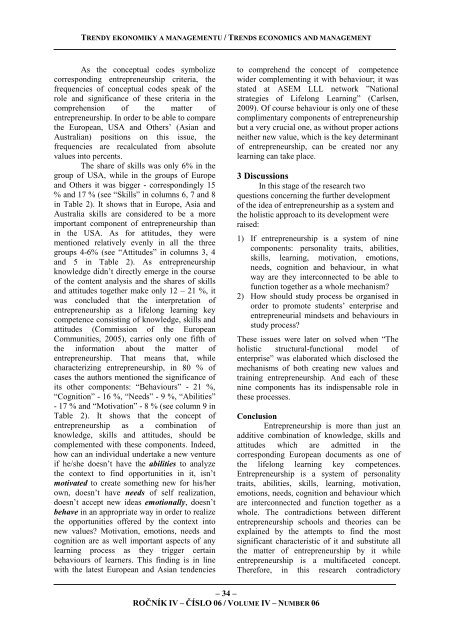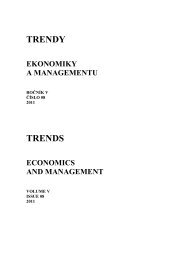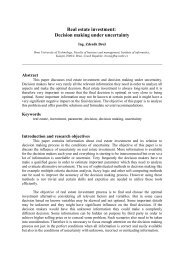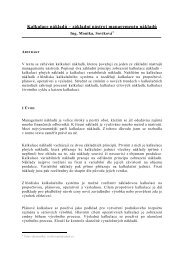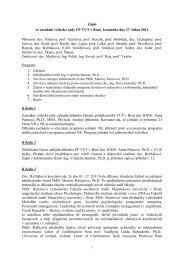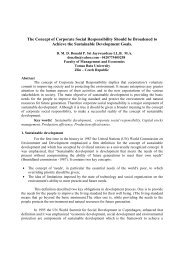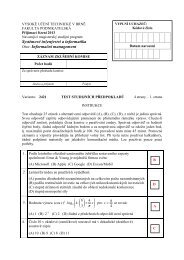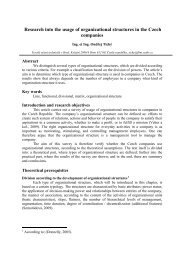Stáhnout toto číslo ve formátu PDF - Fakulta podnikatelská - Vysoké ...
Stáhnout toto číslo ve formátu PDF - Fakulta podnikatelská - Vysoké ...
Stáhnout toto číslo ve formátu PDF - Fakulta podnikatelská - Vysoké ...
Create successful ePaper yourself
Turn your PDF publications into a flip-book with our unique Google optimized e-Paper software.
TRENDY EKONOMIKY A MANAGEMENTU / TRENDS ECONOMICS AND MANAGEMENT<br />
As the conceptual codes symbolize<br />
corresponding entrepreneurship criteria, the<br />
frequencies of conceptual codes speak of the<br />
role and significance of these criteria in the<br />
comprehension of the matter of<br />
entrepreneurship. In order to be able to compare<br />
the European, USA and Others’ (Asian and<br />
Australian) positions on this issue, the<br />
frequencies are recalculated from absolute<br />
values into percents.<br />
The share of skills was only 6% in the<br />
group of USA, while in the groups of Europe<br />
and Others it was bigger - correspondingly 15<br />
% and 17 % (see “Skills” in columns 6, 7 and 8<br />
in Table 2). It shows that in Europe, Asia and<br />
Australia skills are considered to be a more<br />
important component of entrepreneurship than<br />
in the USA. As for attitudes, they were<br />
mentioned relati<strong>ve</strong>ly e<strong>ve</strong>nly in all the three<br />
groups 4-6% (see “Attitudes” in columns 3, 4<br />
and 5 in Table 2). As entrepreneurship<br />
knowledge didn’t directly emerge in the course<br />
of the content analysis and the shares of skills<br />
and attitudes together make only 12 – 21 %, it<br />
was concluded that the interpretation of<br />
entrepreneurship as a lifelong learning key<br />
competence consisting of knowledge, skills and<br />
attitudes (Commission of the European<br />
Communities, 2005), carries only one fifth of<br />
the information about the matter of<br />
entrepreneurship. That means that, while<br />
characterizing entrepreneurship, in 80 % of<br />
cases the authors mentioned the significance of<br />
its other components: “Behaviours” - 21 %,<br />
“Cognition” - 16 %, “Needs” - 9 %, “Abilities”<br />
- 17 % and “Motivation” - 8 % (see column 9 in<br />
Table 2). It shows that the concept of<br />
entrepreneurship as a combination of<br />
knowledge, skills and attitudes, should be<br />
complemented with these components. Indeed,<br />
how can an individual undertake a new <strong>ve</strong>nture<br />
if he/she doesn’t ha<strong>ve</strong> the abilities to analyze<br />
the context to find opportunities in it, isn’t<br />
motivated to create something new for his/her<br />
own, doesn’t ha<strong>ve</strong> needs of self realization,<br />
doesn’t accept new ideas emotionally, doesn’t<br />
beha<strong>ve</strong> in an appropriate way in order to realize<br />
the opportunities offered by the context into<br />
new values? Motivation, emotions, needs and<br />
cognition are as well important aspects of any<br />
learning process as they trigger certain<br />
behaviours of learners. This finding is in line<br />
with the latest European and Asian tendencies<br />
to comprehend the concept of competence<br />
wider complementing it with behaviour; it was<br />
stated at ASEM LLL network ”National<br />
strategies of Lifelong Learning” (Carlsen,<br />
2009). Of course behaviour is only one of these<br />
complimentary components of entrepreneurship<br />
but a <strong>ve</strong>ry crucial one, as without proper actions<br />
neither new value, which is the key determinant<br />
of entrepreneurship, can be created nor any<br />
learning can take place.<br />
3 Discussions<br />
In this stage of the research two<br />
questions concerning the further de<strong>ve</strong>lopment<br />
of the idea of entrepreneurship as a system and<br />
the holistic approach to its de<strong>ve</strong>lopment were<br />
raised:<br />
1) If entrepreneurship is a system of nine<br />
components: personality traits, abilities,<br />
skills, learning, motivation, emotions,<br />
needs, cognition and behaviour, in what<br />
way are they interconnected to be able to<br />
function together as a whole mechanism?<br />
2) How should study process be organised in<br />
order to promote students’ enterprise and<br />
entrepreneurial mindsets and behaviours in<br />
study process?<br />
These issues were later on sol<strong>ve</strong>d when “The<br />
holistic structural-functional model of<br />
enterprise” was elaborated which disclosed the<br />
mechanisms of both creating new values and<br />
training entrepreneurship. And each of these<br />
nine components has its indispensable role in<br />
these processes.<br />
Conclusion<br />
Entrepreneurship is more than just an<br />
additi<strong>ve</strong> combination of knowledge, skills and<br />
attitudes which are admitted in the<br />
corresponding European documents as one of<br />
the lifelong learning key competences.<br />
Entrepreneurship is a system of personality<br />
traits, abilities, skills, learning, motivation,<br />
emotions, needs, cognition and behaviour which<br />
are interconnected and function together as a<br />
whole. The contradictions between different<br />
entrepreneurship schools and theories can be<br />
explained by the attempts to find the most<br />
significant characteristic of it and substitute all<br />
the matter of entrepreneurship by it while<br />
entrepreneurship is a multifaceted concept.<br />
Therefore, in this research contradictory<br />
– 34 –<br />
ROČNÍK IV – ČÍSLO 06 / VOLUME IV – NUMBER 06


